Home > IPMA Level D vs PMP: Which Certification to Choose for Success in Project Management?
Do you want to advance in project management but are unsure which certification to choose? PMP or IPMA Level D, which one will open more doors for you? This choice can make all the difference in your career path. While the PMP certification is globally recognized and valued by companies for high-responsibility positions, IPMA Level D is more suited for beginners who want to establish a solid foundation before progressing. So, which is the best option for you? Cost, prerequisites, recognition, opportunities… In this article, we review everything to help you make the right choice and maximize your professional growth.

The PMP certification, issued by the Project Management Institute (PMI), is globally recognized and intended for experienced project management professionals. It was created to fill the gap in formal project management training and allows project managers to demonstrate their expertise and commitment to the profession.
On the other hand, the IPMA Level D certification is designed to assess the skills of entry-level project managers and serves as an entry point into project management.
These certifications, whether PMP or IPMA Level D, play a crucial role in skill enhancement. They also contribute to the professional recognition of project managers.
The PMP certification offers numerous advantages for both individuals and organizations. For professionals, it helps improve project management skills and enhances their profile in the eyes of employers. For companies, the PMP certification contributes to better resource management and increased project efficiency.
In short, obtaining a PMP certification is a valuable asset. It can positively influence the career of project managers and the success of organizations. Now, let’s explore in detail the key benefits of this globally recognized certification.
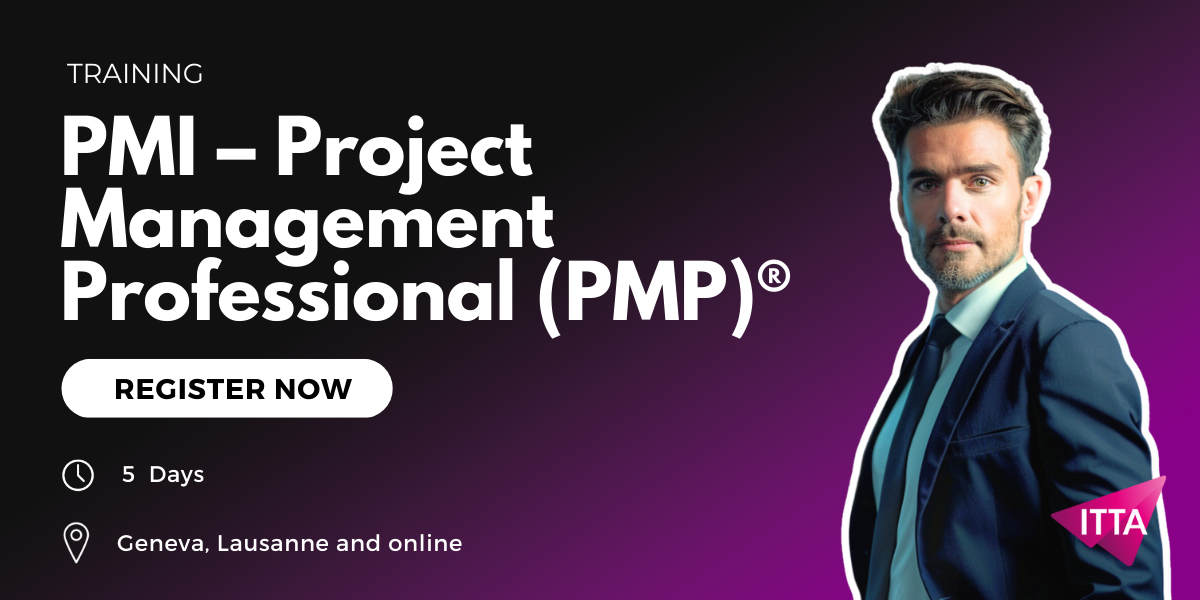
PMP certifications are widely recognized internationally, making them an ideal choice for professionals seeking to work in a global context. In fact, the PMP certification is recognized in over 200 countries, demonstrating expertise in project management on a worldwide scale.
This global recognition allows certification holders to stand out across various industries and contexts, opening up international opportunities. Whether in industry, technology, or the public sector, the PMP certification serves as proof of competence and mastery of best practices in project management.
PMP-certified professionals often benefit from higher salaries and increased career opportunities. The PMP certification enhances the market value of professionals’ skills, making them more attractive to employers.
Additionally, PMP certification holders gain access to management positions across various industries, helping them advance in their careers. This certification not only develops project management skills but also accelerates career progression.
The PMP certification covers a wide range of technical skills, including:
It enables project managers to acquire a variety of essential skills in the field of project management.
In addition to technical skills, the PMP certification also develops general skills, particularly in leadership and communication. These skills are crucial for success and efficiency in project management, meeting market demands.
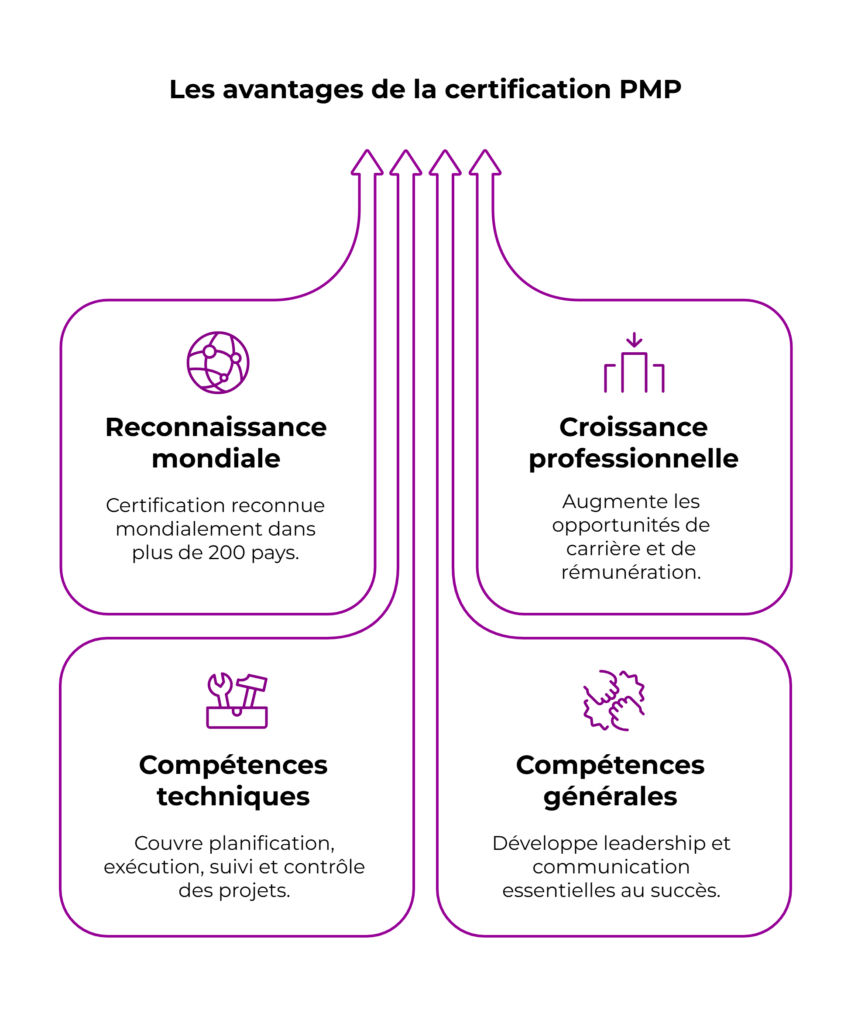
The IPMA Level D certification offers specific advantages for entry-level project management professionals. It helps demonstrate a fundamental mastery of project management skills, which is essential for early-career project managers. It also fosters the development of confidence and autonomy among beginner project managers.
Let’s explore in detail the benefits of the IPMA Level D certification through its competency-based approach, flexibility, adaptability, and networking opportunities.
The IPMA Level D certification enables candidates to acquire technical, behavioral, and contextual skills, offering a comprehensive approach to project management. This certification is particularly suited for those who prioritize a competency-oriented approach and continuous professional development.
It is specifically designed for entry-level project managers, with progressive levels available for more experienced professionals. This ensures an appropriate progression at each stage of a project manager’s career.
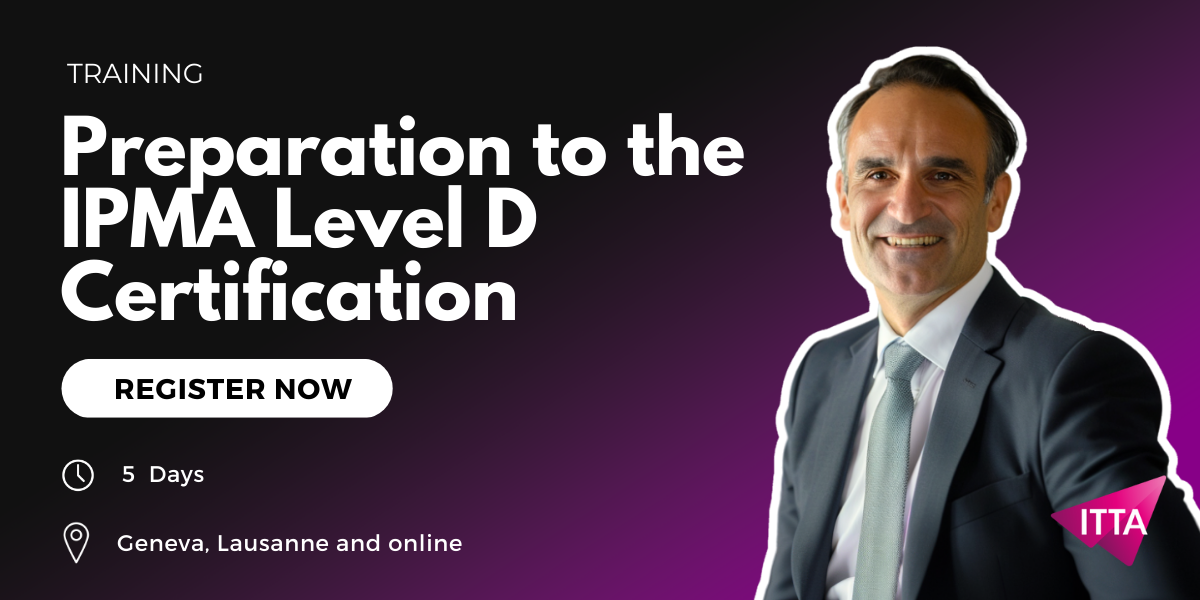
Candidates for the IPMA Level D certification benefit from guidance by experienced trainers, allowing training to be adapted to individual and organizational needs. This flexibility and adaptability in training are major assets for early-career professionals.
IPMA training programs apply to various organizational contexts and adapt to the specific needs of candidates and businesses.
Holders of the IPMA Level D certification have access to networking opportunities with other professionals in both the public and private sectors. This active community promotes exchanges and the sharing of best practices, which is beneficial for continuous professional development.
Through this certification, professionals can participate in various forums and discussion groups to share ideas and experiences, thereby strengthening their professional network and project management skills.
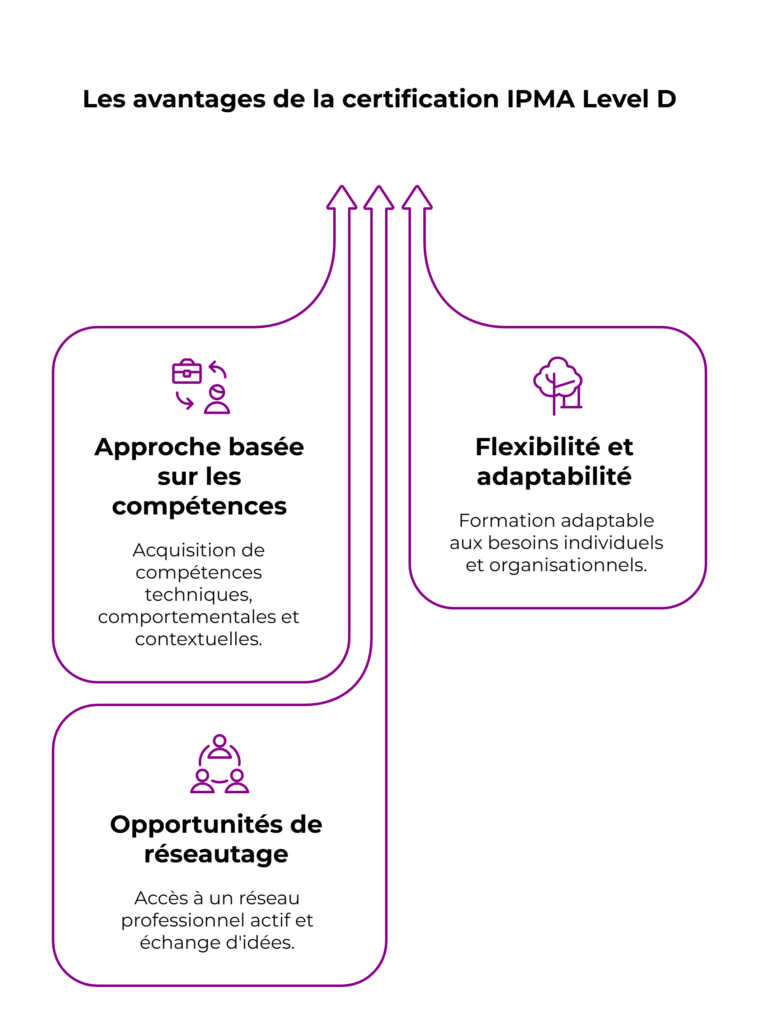
Comparing the certification requirements for PMP and IPMA Level D helps to understand the key differences between these two paths. The PMP certification requires proven project management experience and passing a rigorous exam. In contrast, the IPMA Level D certification requires initial training and an understanding of project management principles but is more flexible in its experience requirements.
Let’s explore in more detail the eligibility criteria and certification processes for both certifications to better understand what is required for each path.
| Criteria | IPMA Level D | PMP (Project Management Professional) |
|---|---|---|
| Professional experience | No minimum experience requirement (project experience recommended) | 3 to 5 years of project management experience, depending on the level of education |
| Project management hours | Not specifically required | 4,500 hours of project management for a higher degree, 7,500 hours for a secondary degree |
| Training/education | No specific training prerequisites, but project management training can be beneficial | 35 hours of project management training required |
| Exam | Exam with questions on basic project management concepts | Detailed exam on project management processes according to PMBOK |
| Exam requirements | Basic theoretical and practical knowledge of project management | In-depth knowledge of project management processes and techniques |
| Certification preparation | Recommended but not mandatory training | 35-hour training required before taking the exam |
| Renewal | No specific renewal required | Renewal every 3 years with 60 PDUs (Professional Development Units) to be accumulated |
| Geographical recognition | More popular in Europe | Recognized worldwide, particularly in the United States and Asia |
| Certification cost | Lower than PMP | Higher due to requirements and global recognition |
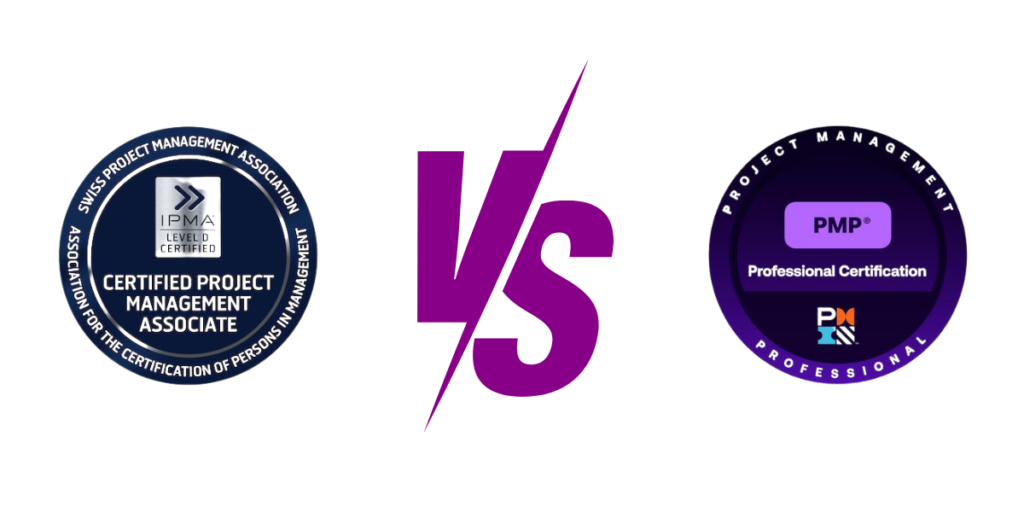
The training methodologies for PMP and IPMA Level D certifications differ mainly in their pedagogical approach. Each certification has its own standards and teaching techniques, including both practical and theoretical approaches. Training programs for IPMA Level D are often flexible, allowing customization based on learners’ needs.
The IPMA Level D certification program is designed to be applicable across various organizational and cultural contexts, whereas PMP follows a more standardized approach.
It is essential to take accredited training courses to increase the chances of passing the certification exams. Enrolling in accredited courses and having an accredited instructor, like with our ITTA center, not only ensures better preparation but also enhances the likelihood of success in the certification exam.
Candidates for the IPMA Level D certification often benefit from coaching support during their preparation, including modules on human resource management and leadership development.
A variety of learning resources, such as manuals and online courses, are available to assist in certification preparation. Learning resources for PMP and IPMA certifications include books, online tools, and practical workshops.
Practical workshops and coaching sessions provide direct interaction and additional support during preparation. These resources help candidates gain comprehensive mastery of the necessary skills to succeed in the exams.
The PMP certification validates project management skills, adding value in the job market. Professionals with a PMP certification are often perceived as more competent by employers, which can lead to increased job opportunities.
Furthermore, PMP certification holders often have access to leadership and advanced management positions within organizations. The IPMA Level D certification, on the other hand, enhances professional credibility and can contribute to higher salaries for its holders.
Evaluating long-term career goals can help determine whether the IPMA Level D or PMP certification is the most suitable. Each certification has its own advantages and meets specific needs in terms of skills and professional development.
For those seeking global recognition and access to advanced management positions, the PMP certification may be the right choice. On the other hand, for beginners or those who prefer a competency-based approach, the IPMA Level D certification is an excellent option.
In summary, both PMP and IPMA Level D certifications offer significant advantages for project management professionals. The PMP certification (PMI) is globally recognized and provides access to advanced management positions, whereas the IPMA Level D certification is ideal for beginners and those looking to develop specific project management skills.
Regardless of your choice, these certifications demonstrate a commitment to the profession and can greatly enhance your career prospects. Take the time to assess your goals and choose the certification that best matches your professional needs.
What is the difference between the PMP and IPMA Level D certification?
The PMP certification is globally recognized and intended for experienced project management professionals. It requires 35 hours of training and several years of experience. In contrast, IPMA Level D is designed for beginners, offering a more flexible, competency-based approach without strict requirements for experience or formal training.
Is the PMP certification more recognized than IPMA Level D?
Yes, PMP is the most internationally recognized certification, particularly in the United States and Asia. It is often required for senior project management positions. IPMA Level D is more prevalent in Europe and serves as an entry-level certification for project management beginners.
Which certification should I choose: PMP or IPMA Level D?
If you are a beginner, IPMA Level D is a great starting point to gain skills and advance in project management. If you have several years of experience and want to boost your career internationally, PMP is a better choice for higher-responsibility positions.
Which certification offers the best career opportunities: PMP or IPMA Level D?
The PMP certification provides more international opportunities, especially for senior project manager or project director roles. It is highly valued by large organizations and often leads to better salaries. On the other hand, IPMA Level D is ideal for those starting out and looking to gain initial project management experience.

ITTA is the leader in IT training and project management solutions and services in French-speaking Switzerland.
Our latest posts
Subscribe to the newsletter
Consult our confirmed trainings and sessions

Nous utilisons des cookies afin de vous garantir une expérience de navigation fluide, agréable et entièrement sécurisée sur notre site. Ces cookies nous permettent d’analyser et d’améliorer nos services en continu, afin de mieux répondre à vos attentes.
Monday to Friday
8:30 AM to 6:00 PM
Tel. 058 307 73 00
ITTA
Route des jeunes 35
1227 Carouge, Suisse
Monday to Friday, from 8:30 am to 06:00 pm.